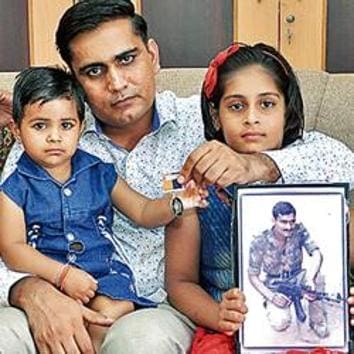Peace the best way to solve problems: Lance Havaldar Ram Kumar’s family
Singh, from 18 Grenadiers, an infantry regiment of the Indian Army posted at Drass-Kargil in Jammu and Kashmir, was just 33 when he was killed in battle.
It was 5.30pm on a hot June day in 1999, when a jeep of the Indian Army stopped outside the house of Lance Havildar Ram Kumar at Devawas village of Bhiwani district in Haryana. The officials had come to inform the family of Kumar’s martyrdom in the ongoing war with Pakistan, in Kargil.

Singh, from 18 Grenadiers, an infantry regiment of the Indian Army posted at Drass-Kargil in Jammu and Kashmir, was just 33 when he was killed in battle.
Though he was just six, Kumar’s son Nagender Singh recalled the June 5 evening clearly. He was playing with friends on the street outside his home, when a bunch of army officials stepped out of the jeep.
“Someone told them that I was Havaldar Ram Kumar’s son. One of the soldiers lifted me up and asked, ‘Beta, aapki mummy kahan hain’ (Son, where is your mother?),” Singh said. His mother had received a letter from the Army that same afternoon, and she had visited her sister, who was literate, to enquire about its contents.
As Singh went off to call his mother from a neighbour’s phone, the officials informed Kumar’s father, Chaudhary Charan Singh about his son’s demise.
“Within 15 to 20 minutes, the news of my father’s death had spread in the whole village,” he said.
On the intervening night of June 2/3, 18 Grenadiers launched a third assault on Tololing peak in Drass sector to evict the Pakistan army regulars who had captured the post at over 15,000 feet. Ram Kumar was injured in the shoulder and waist from gunfire. However, he inched closer to the enemy bunker and lobbed a hand grenade, killing its occupants and injuring two more.
Kamla Devi, Kumar’s wife who was 33 at the time of his death and a mother of three, said the conversation with the officials that evening left a deep impression. “The army officials told me that my husband fought bravely. I asked them to tell me how brave he was, what determination he showed, and how courageous and compassionate he was. I have been narrating the same answer to my children and now, grandchildren,” she said.
Soon after Kumar’s death, Kamla Devi moved to Behal village, where the government allotted her a gas agency, as compensation to families of martyrs.
“It was difficult for a woman to stay in another town just a year after her husband’s death. (But at least) I sent my children to good schools.” It wasn’t easy, but Kamla Devi doesn’t regret her decision. While Singh is completing his post graduate degree in law, her other son, Devender Lamba, runs the gas agency. Her daughter, Sonu, an engineer in computer science, lives in Delhi.
Kamla Devi also received Rs 10 lakh and a flat in Delhi.
“I have only one compliant. The Haryana government gives jobs to martyr’s kin, but officer’s kin get B grade while sepoy’s kin get C and D grade positions. This is not fair,” she said.
Lamba said that the bloodbath between both countries should end.
“In war, the soldiers will have to die from both the sides and I urged both the governments to stop this bloodbath. Peace is the best way to solve a problem. Our family had no complaints from the government. The army officials are still in our touch and I am proud about all our soldiers,” he said.






